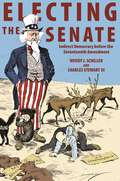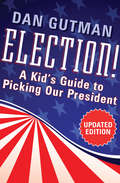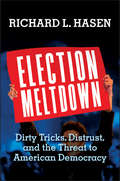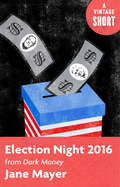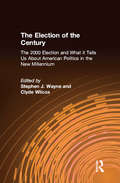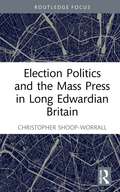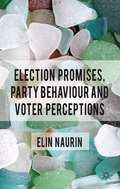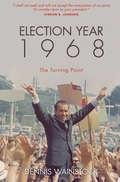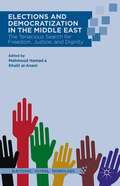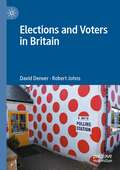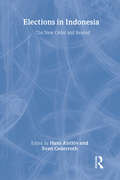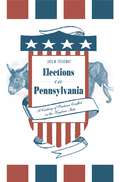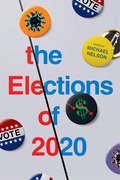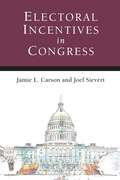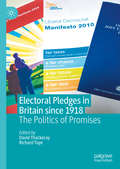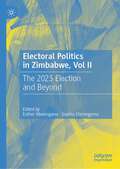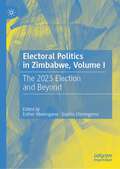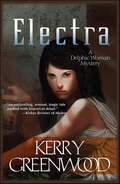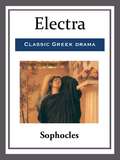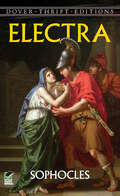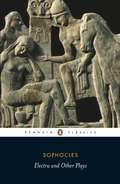- Table View
- List View
Electing the Senate: Indirect Democracy before the Seventeenth Amendment (Princeton Studies in American Politics: Historical, International, and Comparative Perspectives #146)
by Wendy J. Schiller Charles StewartHow U.S. senators were chosen prior to the Seventeenth Amendment—and the consequences of Constitutional reformFrom 1789 to 1913, U.S. senators were not directly elected by the people—instead the Constitution mandated that they be chosen by state legislators. This radically changed in 1913, when the Seventeenth Amendment to the Constitution was ratified, giving the public a direct vote. Electing the Senate investigates the electoral connections among constituents, state legislators, political parties, and U.S. senators during the age of indirect elections. Wendy Schiller and Charles Stewart find that even though parties controlled the partisan affiliation of the winning candidate for Senate, they had much less control over the universe of candidates who competed for votes in Senate elections and the parties did not always succeed in resolving internal conflict among their rank and file. Party politics, money, and personal ambition dominated the election process, in a system originally designed to insulate the Senate from public pressure.Electing the Senate uses an original data set of all the roll call votes cast by state legislators for U.S. senators from 1871 to 1913 and all state legislators who served during this time. Newspaper and biographical accounts uncover vivid stories of the political maneuvering, corruption, and partisanship—played out by elite political actors, from elected officials, to party machine bosses, to wealthy business owners—that dominated the indirect Senate elections process. Electing the Senate raises important questions about the effectiveness of Constitutional reforms, such as the Seventeenth Amendment, that promised to produce a more responsive and accountable government.
Election!: A Kid's Guide to Picking Our President
by Dan GutmanA fun, funny, and informative guide to the weird world of American politics How does the president get his job? How do people know who will win an election before everybody's voted? Do the candidates hate each other? Dan Gutman takes on his strangest subject ever: the American political system. Reaching through history from the days of the founding fathers to today's voting system, Gutman tackles complex subjects in a clear, easy-to-understand way. Even grown-ups will find something in here that they've never learned before. Politics are a crazy game, and with Dan Gutman teaching you the rules, you're going to have a blast learning how to play.
The Election Game and How to Win It
by Joseph NapolitanIt is a personal book relating some of author's experiences in managing political campaigns and counseling candidates in the United States and foreign countries for the past fifteen years.
Election Journal: The Political Events of 1987-1988
by Elizabeth DrewThe Presidential election of 1988 changed Presidential politics, in ways that will be with us for a long time. New techniques, ans a new tone, were employed, and since they were successful, they are likely to be emulated throughout our political system.
Election Meltdown: Dirty Tricks, Distrust, and the Threat to American Democracy
by Richard L. HasenFrom the nation&’s leading expert, an indispensable analysis of key threats to the integrity of the 2020 American presidential election As the 2020 presidential campaign begins to take shape, there is widespread distrust of the fairness and accuracy of American elections. In this timely and accessible book, Richard L. Hasen uses riveting stories illustrating four factors increasing the mistrust. Voter suppression has escalated as a Republican tool aimed to depress turnout of likely Democratic voters, fueling suspicion. Pockets of incompetence in election administration, often in large cities controlled by Democrats, have created an opening to claims of unfairness. Old-fashioned and new-fangled dirty tricks, including foreign and domestic misinformation campaigns via social media, threaten electoral integrity. Inflammatory rhetoric about &“stolen&” elections supercharges distrust among hardcore partisans. Taking into account how each of these threats has manifested in recent years—most notably in the 2016 and 2018 elections—Hasen offers concrete steps that need to be taken to restore trust in American elections before the democratic process is completely undermined.
Election Night 2016: From Dark Money (A Vintage Short)
by Jane MayerThe last president election was a stunning political upset when Donald Trump, a billionaire businessman won in a political coup, with no experience whatsoever. But along with this outsider, on the night of his victory, longtime conservative operator David Koch was standing, and smiling, amid a throng of revelers on the eve of November 8, 2016. In her electrifying and much-lauded, bestselling book, Jane Mayer reveals that the era of the Koch brothers and big money in American politics is far from over, despite how much discussion there is to the contrary. Rather, the secret figures behind the moneyed American oligarchy continue to wield tremendous influence over the political agendas of the Trump administration, the Republican Party today, the radical Right, and all corridors of power in Washington. A Vintage Shorts Selection. An ebook short.
The Election of the Century: The 2000 Election and What it Tells Us About American Politics in the New Millennium (Power, Conflict, And Democracy: American Politics Into The 21st Century Ser.)
by Stephen J. Wayne Clyde WilcoxThis book places the 2000 presidential and congressional elections into the larger and future context of American politics. The essays in Part I focus on the role of "wedge" issues in 2000, including the economy, foreign policy, and race. Part II examines the electorate in terms of gender, religion, and age. Part III analyzes Republican and Democratic strategies in 2000. Part IV focuses in on specific factors affecting the 2000 races including the Clinton factor.
Election Politics and the Mass Press in Long Edwardian Britain (Routledge Focus on Journalism Studies)
by Christopher Shoop-WorrallThis book explores the ways in which the emergence of the ‘new’ daily mass press of the late-nineteenth and early-twentieth centuries represented a hugely significant period in histories of both the British press and the British political system. Drawing on a parallel analysis of election-time newspaper content and archived political correspondence, the author argues that the ‘new dailies’ were a welcome and vibrant addition to the mass political culture that existed in Britain prior to World War One. Chapters explore the ways in which the three ‘new dailies’ – Mail, Express, and Mirror – represented political news during the four general elections of the period; how their content intersected with, and became a part of, the mass consumer culture of pre-Great War Britain; and the differing ways political parties reacted to this new press, and what those reactions said about broader political attitudes towards the worth of ‘mass’ political communication. This book will be of interest to students and scholars of media history, British popular politics, journalism history, and media studies.
Election Promises, Party Behaviour and Voter Perceptions
by Elin NaurinAn exploration of whether politicians are perceived to keep their election promises. While scholars claim that parties act on most of their election promises, citizens hold the opposite view. This 'Pledge Puzzle' guides Naurin in her analysis of the often referred to but not empirically investigated, 'conventional wisdom' about election promises.
Election Year 1968
by Dennis D. WainstockThe 1968 election saw the return of the Republican party to the White House and major changes in the political landscape. It was one of the most contentious and unpredictable contests in American history. From Lyndon Baines Johnson's exit following Eugene McCarthy's win in New Hampshire to the Robert Francis Kennedy murder, the Martin Luther King, Jr. assassination, and the Chicago Democratic Convention, it relives in this recounting of that explosive year. Vietnam was the main issue but also civil rights and George Wallace, who captured an astounding thirteen percent of the vote. The author interviewed some thirty-five politicians and players, most of them previously unpublished. Dennis D. Wainstock, PhD, is the author of Malcolm X: The Life and Times of an African-American Revolutionary, The Decision to Drop the Atomic Bomb, and Truman, MacArthur and the Korean War. He teaches history at Fairmont State University and lives in Salem, West Virginia.
Elections and Democratization in the Middle East
by Mahmoud Hamad Khalil Al-AnaniTop scholars of the Middle East set out the history and future of elections in eight Middle East countries. Examining issues associated with elections, the transition of governance, and the ways in which technology shapes popular participation in politics and elections, they discuss the future of governance and democratic transition in the region.
Elections and Voters in Britain
by David Denver Robert JohnsHow do voters in Britain decide which party to vote for in elections? Have age and education replaced class as the social basis for voting? Are elections now ‘presidentialised’, with voters simply choosing between party leaders? What role do the media, new and old, play in all of this? The authors examine these and other questions in the fourth edition of this popular text. The core of the text is devoted to examining and explaining theories of party choice, including the debate about whether voters are driven more by issues and ideology or simply by which party and leader looks least likely to make a mess of things in office. The authors also devote separate chapters to turnout trends and patterns, the media, electoral systems, the geography of party support, and – new to this edition – referendums. Fully revised and with detailed analysis of the 2019 election and the electoral fallout of Brexit, the text incorporates the latest research on elections and voting behaviour, and includes analysis of recent trends and developments – such as the effect of digital media on electoral politics and where recent misfires leave the opinion polls.
Elections in Indonesia: The New Order and Beyond
by Hans Antlöv and Sven CederrothIt has sometimes been argued that many Indonesians had little sympathy with western notions of elections being events for the contesting and transfer of power and that they rather supported the New Order's use of 'festivals of democracy', elections as occasions at which the mass of ordinary Indonesians were given the opportunity to celebrate the country's achievements under the rule of its New Order leadership as well as legitimize the continued rule of these leaders. But the need to stage-manage these 'elections' as New Order triumphs finally undid the regime. With chapters describing the last New Order election and the first free election in the post-Suharto era, this volume makes an important contribution to our understanding of the demise of the New Order, and the directions being taken by the emerging regime.
Elections in Oxford County, 1837-1875
by George EmeryElections in Oxford County, 1837-75 is a unique exploration of the forms, practices, and issues of democracy in a mid-nineteenth-century colonial setting. In this case study of thirty-eight elections in Oxford County -- first as part of the United Province of Canada, then in early Ontario -- George Emery delves into the advances, setbacks, and flaws of a partially democratic system. Emery demonstrates that while its forms and issues evolved, the net amount of democracy remained stable over time.Elections in Oxford County, 1837-75 breaks new ground with its detailed treatment of the county's voice-vote method of election, which ended with the adoption of the secret ballot in 1874. Employing an idealized parliamentary democracy as an explanatory model, Emery captures both geographically specific details and general features of this era's electoral process to enrich current understandings of nineteenth-century Canadian democracy.
Elections in Pennsylvania: A Century of Partisan Conflict in the Keystone State
by Jack M. TreadwayThe most comprehensive state election study ever undertaken, Elections in Pennsylvania provides data and analysis for more than 13,000 general elections and more than 6,000 primary elections held in the state between 1900 and 1998, with a postscript examining in less detail the elections of 2000 and 2002. Included are all elections for president, governor, U.S. senators and representatives, statewide offices, and members of the General Assembly. The extensive period of time covered allows the author to provide an important historical perspective on electoral trends, distinguishing what are genuinely new developments in electoral dynamics and voting behavior in recent decades from what are continuations of patterns earlier in the century.
The Elections of 2020
by Michael NelsonPomper, Rutgers University * Paul J. Quirk, University of British Columbia * Andrew Rudalevige, Bowdoin College * Candis Watts Smith, Pennsylvania State University
Electoral Incentives in Congress (Legislative Politics And Policy Making)
by Jamie L Carson Joel SievertDavid Mayhew’s 1974 thesis on the “electoral connection” and its impact on legislative behavior is the theoretical foundation for research on the modern U.S. Congress. Mayhew contends that once in office, legislators pursue the actions that put them in the best position for reelection. The electoral connection is a post-World War II phenomenon, but legislative scholars now suggest that Mayhew’s argument applies to earlier congressional eras. To assess these claims, Carson and Sievert investigate whether earlier legislators were motivated by the same factors that influence their behavior today, especially in pursuit of reelection. They examine how electoral incentives shape legislative behavior throughout the nineteenth century by looking at patterns of turnover in Congress; the re-nomination of candidates; the roles of parties in recruiting candidates, and by extension their broader effects on candidate competition; and, finally by examining legislators’ accountability. The results have wide-ranging implications for the evolution of Congress and the development of various legislative institutions over time.
Electoral Pledges in Britain Since 1918: The Politics of Promises
by David Thackeray Richard ToyeNobody doubts that politicians ought to fulfil their promises – what people cannot agree about is what this means in practice. The purpose of this book is to explore this issue through a series of case studies. It shows how the British model of politics has changed since the early twentieth century when electioneering was based on the articulation of principles which, it was expected, might well be adapted once the party or politician that promoted them took office. Thereafter manifestos became increasingly central to electoral politics and to the practice of governing, and this has been especially the case since 1945. Parties were now expected to outline in detail what they would do in office and explain how the policies would be paid for. Brexit has complicated this process, with the ‘will of the people’ as supposedly expressed in the 2016 referendum result clashing with the conventional role of the election manifesto as offering a mandate for action.
Electoral Politics in Zimbabwe, Vol II: The 2023 Election and Beyond
by Esther Mavengano Sophia ChirongomaVolume two of Electoral Politics in Zimbabwe: The 2023 Election and Beyond argues that research into Zimbabwe’s politics is multifaceted and topical, particularly because for more than two decades now, this Southern African state has been dogged by multiple problems including hyperinflation, drought, escalating poverty levels, extremely high unemployment rates and political instabilities. The volume’s overall goal is to ignite intellectual discussions and practical action towards turning the political wheels that have been in place for decades. The first segment examines the interface between gender and electoral politics in Zimbabwe. The second part discusses the role of the media in Zimbabwe’s electoral politics. The third section reflects on the role of traditional leaders and religious discourses in Zimbabwe’s electoral politics. The book will be a key resource to colleges, universities and organisations in Zimbabwe, the Southern Africa region and even beyond.
Electoral Politics in Zimbabwe, Volume I: The 2023 Election and Beyond
by Esther Mavengano Sophia ChirongomaVolume one of Electoral Politics in Zimbabwe pays special attention to the overarching view that the 2023 harmonized elections define the fate of the major presidential contenders and their parties as well as (re) shaping the political and economic trajectories of the nation. Cognizant of the complex nature of the Zimbabwean political realm and nuanced dynamics at play, the chapters in this volume cover three interrelated themes: the electoral environment in Zimbabwean politics; language, politics, and elections in Zimbabwe; and lastly, electoral institutions and human rights in Zimbabwean politics. The chapters foreground the ongoing tensions and politicking between the two main rivals, the ruling party, ZANU PF and the main opposition party, the Citizens Coalition for Change (CCC). The contributors also highlight the impact of internal tensions and factionalism within the contending parties, the apparent voter apathy, disconcerting voices due to claims about lack of transparency and a toxic political space as factors impacting on the outcome of the 2023 presidential elections. The volume will appeal to academics and practitioners in politics, human rights, religion, gender, media, languages, linguistics, and development studies.
Electoral Reform and National Security in Japan
by Amy CatalinacJapan is the third-largest economy in the world and a key ally of the United States. Yet the determinants of Japanese security policy are not well understood. The question of why Japan never sought the independent military capabilities that would be commensurate with its economic power has puzzled scholars of international relations for decades. Applying new tools for the quantitative analysis of text to a new collection of 7,497 Japanese-language election manifestos used in elections between 1986 and 2009, this book argues that the electoral strategies politicians in the ruling party were forced to adopt under Japan's old electoral system made it extraordinarily difficult for them to focus on security issues and to change security policy. It was only when their electoral strategies shifted after electoral reform in 1994 that these same politicians became able to pay attention and change security policy.
Electra: A Delphic Woman Novel (Delphic Women Series #3)
by Kerry GreenwoodIt is 28 CE, the time of the feast of Tabernacles. A servant girl is found in the baths of the palace of King Herod Antipas, her throat cut. Jerusalem is buzzing over the brutal death of a prophet, John, known familiarly as the Baptizer, and Prefect Pontius Pilate wants no more trouble. So he coerces Gamaliel, the chief rabbi and head of the Sanhedrin, into investigating the girl's death. Gamaliel is a Talmudic scholar, not a sleuth. But as he learns more of the dead girl's background and that of some key suspects, he begins to fit the evidence together. The entwined histories of Julius Caesar, Cleopatra, Herod the Great, Anthony, and Augustus Caesar suddenly gain relevance to affairs in Jerusalem. And all the while, an itinerant rabbi from Nazareth with his ragged band of enthusiasts and his habit of annoying Caiaphas, the High Priest, moves enigmatically in the background....
Electra
by SophoclesSet in the city of Argos a few years after the Trojan war, 'Electra' recounts the tale of Electra and the vengeance that she and her brother Orestes take on their mother Clytemnestra and step father Aegisthus for the murder of their father, Agamemnon.
Electra
by SophoclesMasterpiece of drama concerns the revenge Electra takes on her mother for the murder of her father. One of the best-known heroines of all drama and a towering figure of Greek tragedy.
Electra and Other Plays: Ajax, Women Of Trachis, Electra, And Philoctetes
by SophoclesSophocles’ innovative plays transformed Greek myths into dramas featuring complex human characters, through which he explored profound moral issues. Electra portrays the grief of a young woman for her father Agamemnon, who has been killed by her mother’s lover. Aeschylus and Euripides also dramatized this story, but the objectivity and humanity of Sophocles’ version provides a new perspective. Depicting the fall of a great hero, Ajax examines the enigma of power and weakness combined in one being, while the Women of Trachis portrays the tragic love and error of Heracles’ deserted wife Deianeira, and Philoctetes deals with the conflict between physical force and moral strength.
